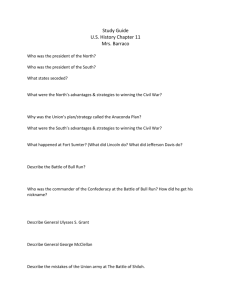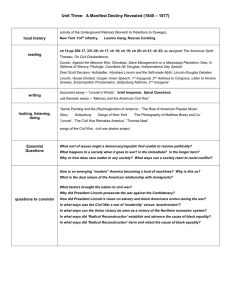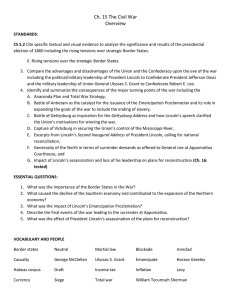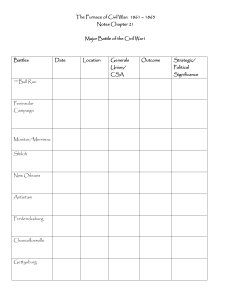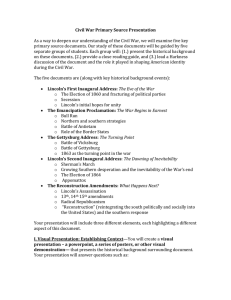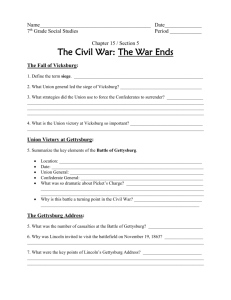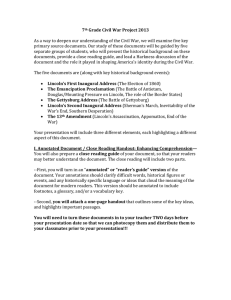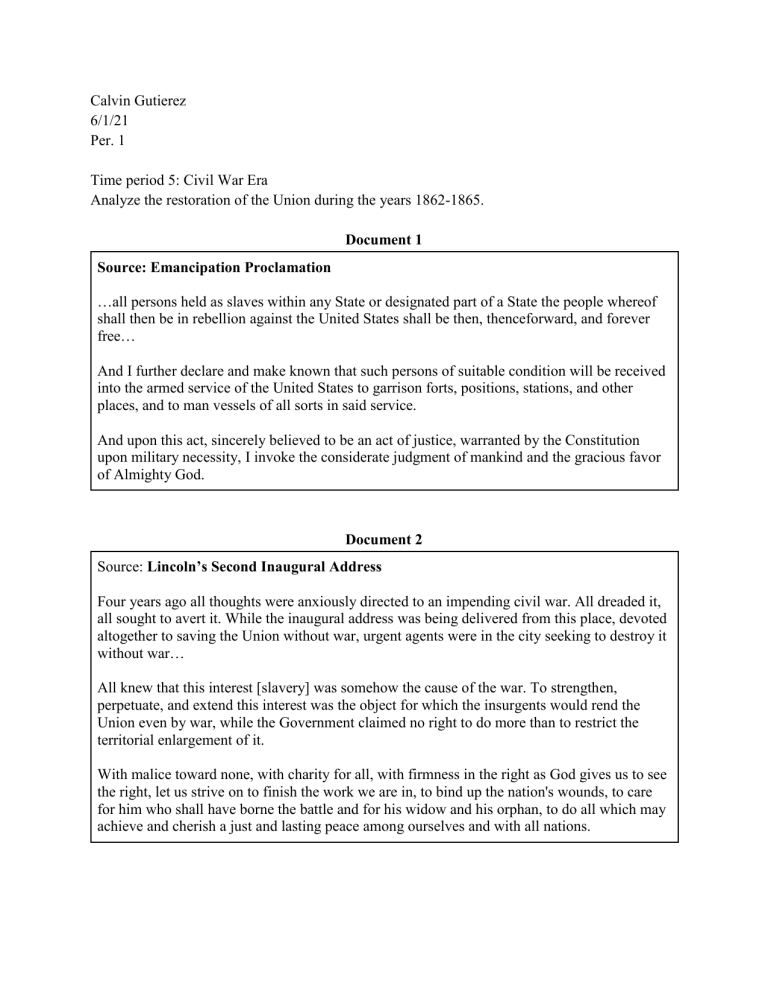
Calvin Gutierez 6/1/21 Per. 1 Time period 5: Civil War Era Analyze the restoration of the Union during the years 1862-1865. Document 1 Source: Emancipation Proclamation …all persons held as slaves within any State or designated part of a State the people whereof shall then be in rebellion against the United States shall be then, thenceforward, and forever free… And I further declare and make known that such persons of suitable condition will be received into the armed service of the United States to garrison forts, positions, stations, and other places, and to man vessels of all sorts in said service. And upon this act, sincerely believed to be an act of justice, warranted by the Constitution upon military necessity, I invoke the considerate judgment of mankind and the gracious favor of Almighty God. Document 2 Source: Lincoln’s Second Inaugural Address Four years ago all thoughts were anxiously directed to an impending civil war. All dreaded it, all sought to avert it. While the inaugural address was being delivered from this place, devoted altogether to saving the Union without war, urgent agents were in the city seeking to destroy it without war… All knew that this interest [slavery] was somehow the cause of the war. To strengthen, perpetuate, and extend this interest was the object for which the insurgents would rend the Union even by war, while the Government claimed no right to do more than to restrict the territorial enlargement of it. With malice toward none, with charity for all, with firmness in the right as God gives us to see the right, let us strive on to finish the work we are in, to bind up the nation's wounds, to care for him who shall have borne the battle and for his widow and his orphan, to do all which may achieve and cherish a just and lasting peace among ourselves and with all nations. Document 3 Source: Clement Vallandigham, speech to New York Democrats To say that because there is a rebellion in South Carolina, a man shall not have freedom of speech, freedom of the press, or any of his rights untrammeled in the state of New York…when the attempt is made to take away [these] rights…THEN THE HOUR WILL HAVE ARRIVED WHEN IT WILL BE THE DUTY OF FREE MEN TO FIND SOME OTHER AND EFFICIENT MODE OF DEFENDING THEIR LIBERTIES. Our fathers did not inaugurate the Revolution of 1776… to escape from the mild and moderate control of a constitutional monarchy like that of England, to be at last, in the third generation, subjected to a tyranny equal to that of any upon the face of the globe. Document 4 Source: Gettysburg Address But, in a larger sense, we can not dedicate -- we can not consecrate -- we can not hallow -- this ground. The brave men, living and dead, who struggled here, have consecrated it, far above our poor power to add or detract. The world will little note, nor long remember what we say here, but it can never forget what they did here. It is for us the living, rather, to be dedicated here to the unfinished work which they who fought here have thus far so nobly advanced. It is rather for us to be here dedicated to the great task remaining before us -- that from these honored dead we take increased devotion to that cause for which they gave the last full measure of devotion -- that we here highly resolve that these dead shall not have died in vain -- that this nation, under God, shall have a new birth of freedom -- and that government of the people, by the people, for the people, shall not perish from the earth. Document 5 Source: “The Miscegenation Ball” (1864) Document 6 Source: From U.S. Grant To R.E. Lee Appomattox Court-House, Virginia General: In accordance with the substance of my letter to you of the 8th instant, I propose to receive the surrender of the army of Northern Virginia on the following terms, to wit: Rolls of all the officers and men to be made in duplicate, one copy to be given to an officer to be designated by me, the other to be retained by such officer or officers as you may designate. The officers to give their individual paroles not to take up arms against the government of the United States until properly exchanged; and each company or regimental commander to sign a like parole for the men of their commands. The arms, artillery, and public property to be parked and stacked, and turned over to the officers appointed by me to receive them. This will not embrace the side-arms of the officers nor their private horses or baggage. This done, each officer and man will be allowed to return to his home, not to be disturbed by United States authority so long as they observe their paroles and the laws in force where they may reside. Ulysses S. Grant, Lieutenant-General Thesis The restoration of the union helped improve morale and order in the broken state of America. Earns point because it’s specific in what the restoration of the union did. The restoration of the union was significant for many reasons. Contextualization The American civil war is known as the bloodiest Earns point because it explains what American war on earth with more deaths combined the civil war was and why the until the Vietnam war. During this time many battles reconstruction era happened. were fought and many towns were destroyed in the process of winning the war. After this war, the south decided to surrender and abolish the confederate and the state of America needed repairing, both physically and morally. The American civil war happened during 1891-1895, and after the reconstruction era happened. Document Summaries Doesn’t earn points because it doesn’t give any good reasons and keeps it vague and broad. Doesn’t earn points because it doesn’t fully explain the civil war or why America needed reconstruction. Doc 1: Source: The Emancipation Proclamation, (Jan. 1, 1863). The Emancipation Proclamation, or Proclamation 95, was a presidential proclamation and executive order issued by United States President Abraham Lincoln on September 22, 1862, during the Civil War. Doc 2: Source: Lincoln’s Second Inaugural Address, (March 4, 1865). On March 4, 1865, in his second inaugural address, President Abraham Lincoln spoke of mutual forgiveness, North and South, asserting that the true mettle of a nation lies in its capacity for charity. Lincoln presided over the nation's most terrible crisis. Doc 3: Source: Clement Vallandigham, speech to New York Democrats, (1863). Vallandigham's speech included a proposal to end the military conflict. He advocated an armistice and the demobilization of the military forces of both the Union and Confederacy. Doc 4: Source: The Gettysburg Address, (November 19, 1863). Lincoln's main purpose was to urge everyone to honor those who had died at Gettysburg by striving to maintain the kind of nation imagined by America's founders. Doc 5: Source: Image of the “The Miscegenation Ball”, (1864). This hand-colored print depicts a fictionalized account of a Republican campaign event dance that occurred at the Lincoln Central Campaign Club in New York on Sept. 22, 1864. Doc 6: Source: The surrender of Robert E. Lee, (April 9, 1865). Lee decided to surrender his army in part because he wanted to prevent unnecessary destruction to the South. When it became clear to the Confederates that they were stretched too thinly to break through the Union lines, Lee observed that “there is nothing left me to do but to go and see Gen. Using the documents Sourcing Supporting the argument that the restoration of the union helped in improving morale and order in America; “Gettysburg Address (Document 4) The world will little note, nor long remember what we say here, but it can never forget what they did here. It is for us the living, rather, to be dedicated here to the unfinished work which they who fought here have thus far so nobly advanced.” Earns point because it states why this document is useful in supporting their argument and gives the part of the document needed to support their argument. “…all persons held as slaves within any State or designated part of a State the people whereof shall then be in rebellion against the United States shall be then, thenceforward, and forever free… (Document 1).” Doesn’t earn points because it just states the document without explaining why they used it or how it supports their argument. Ulysses S. Grant (Document 6) writing as a Lieutenant-General, proposed to accept the surrender of the North Virginian army to help improve the morale of citizens of both Northerners and southerners and end the war. Earns point because it explains the significance of the point of view of Ulysses S. Grant in the document. The point of view of Document 6 supports the argument because they accept the surrender of North Virginia. Doesn’t earn points because it doesn’t explain the significance of the point of view in the document.
